The Home Front is an ongoing series where we highlight the mission and ministry taking place around our territory. We will visit each Canadian province and territory, as well as Bermuda, and celebrate the innovation and impact the Army is having in corps, social services and youth ministry.
In July 2023, Majors Tony Brushett and Beverly Howell-Brushett arrived in Yellowknife, N.W.T., excited to take up new appointments and get to know the people and community. Three weeks later, the entire city was ordered to evacuate—an unprecedented response to threatening wildfires. Major Brushett had one day to charter a plane and get as many of The Salvation Army’s shelter and program clients as possible out of the city.
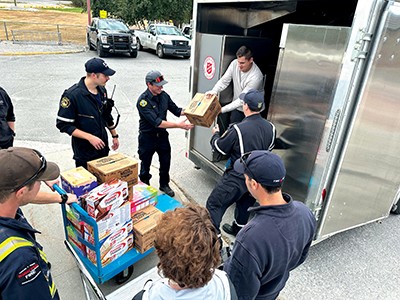
Over the next few days, the team supported these vulnerable individuals, and then worked to get them safely back to Yellowknife once the evacuation order was lifted.
“A positive outcome from this emergency was that I was able to meet the key government and NGO officials in the Northwest Territories in the first six weeks of my appointment—something that might typically take a year,” says Major Brushett, executive director and associate corps officer, Yellowknife Corps and Resource Centre. “We now have a voice at many tables, discussing the social services needed here, and what level of participation The Salvation Army would like to have.”
COST OF LIVING
The Salvation Army’s Yellowknife Corps and Resource Centre, the only ministry unit in the Northwest Territories, offers a full range of services and programs, including a men’s shelter, transitional housing, withdrawal management and mental-health services, a thrift store and food bank.
“Yellowknife is a beautiful city, but it can be a tough place to live,” says Major Beverly Howell-Brushett, corps officer and director of spiritual care. “Coming from Newfoundland and Labrador, it feels a lot like home. It has that small-town feel—it’s a caring, closeknit community. But it also has a disparity of wealth.”
“One of the biggest challenges is food insecurity,” adds Major Brushett. “I’d estimate it’s about 20 to 40 percent more for a basket of food up here than it would be in Alberta.”
Although the cost of living is higher in general, leading more people to access the Army’s services, the wildfire has also had an impact on the demographics of those using the food bank.
“Some people lost up to six weeks pay due to the evacuation, and that was the difference between being able to afford to eat and to pay their bills,” says Major Brushett. “We used to see mostly single people or couples who were struggling at the food bank. Now we’re seeing more families than ever before—about 60-100 a week.”
Housing, especially supportive housing, is another challenge. And in a place where the average high is -28 C in January, sleeping outside in winter is life-threatening.
“There aren’t enough shelter beds,” says Major Howell-Brushett. “It’s a big issue in a small place.”
PATH OF LEARNING
In a city of about 21,000 people, a disproportionate number struggle with addiction and mental health. Although Indigenous people represent approximately 26 percent of the population, they are about 90 percent of the Army’s clients—a reminder of the ongoing impact of colonialism.
Understanding this history and how it affects the present is important to Major Brushett.
“Indigenous cultures deserve to be recognized and understood. We need to listen to their perspectives and not assume we know what they need,” he says. “We’re trying to take the next steps toward reconciliation.”
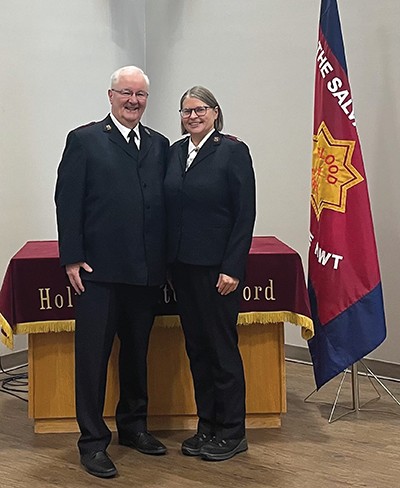
Some of these steps include inviting Indigenous elders to teach classes, building relationships with Indigenous leaders to whom he can turn for advice and actively seeking Indigenous leaders for the Army’s community advisory council.
“I’m being led every day by individuals who nudge me along the path,” he says. “Even though I’m in my 60s, I feel like I’m back in school again, learning from the bottom up—and I’m fine with that.”
PILOT PROJECT
The Northwest Territories has no residential addiction treatment centre, which means that people need to leave the community for treatment. When they return, however, they often end up back in an environment that doesn’t support their recovery. The Salvation Army is addressing this gap with a new transitional housing aftercare program.
“It’s a five-bed home where people can stay for 30 to 90 days, with full-time, 24-7 staff who are working to help them reintegrate into society—whether that’s being with family, going back to school or working,” says Major Brushett. “It will give people a fighting chance.”
After many years working in this field, he knows there are no quick solutions or easy victories.
“We just need to take one person at a time,” he says. “I go home at night and spend a few moments reflecting on the day. And if it’s a day with no visible victories, I can still find steps that were taken to drop the right seeds in front of the right person.”
SPIRITUAL AND SOCIAL
Major Howell-Brushett provides spiritual care for the resource centre and leads a small corps (see our interview with Major Howell-Brushett here). Although the numbers fluctuate, it is a close congregation with a willingness to serve. The corps recently hosted a Thanksgiving meal for the community, and church members volunteer with Christmas kettles and toy distribution.
Once a month, the congregation gathers for Sunday brunch after the service, with the corps transformed into a café.
“It’s always well attended, sometimes by program participants and shelter guests as well,” says Major HowellBrushett. “For people who are often told to move along or looked at with the perspective of ‘What are you doing here?’ it’s great to feel welcome and invited.”
While the numbers may be small, Major Howell-Brushett is more concerned with spiritual depth and seeking opportunities for the corps to continue serving the community and the social service ministries.
“We don’t have to go far for the mission field,” she says. “It’s just on the other side of the wall.”
THANKSGIVING TRADITION
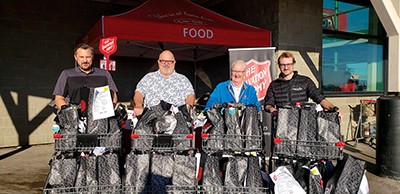
the Yellowknife Co-op, who partnered with
The Salvation Army for a Thanksgiving food drive
In October, The Salvation Army in Yellowknife partnered with a local grocery store for a Thanksgiving tradition. Staff and volunteers sold 500 food hampers, each worth $25, outside a Co-op store, and they were all donated back to the food bank.
The tradition of giving hampers right after Thanksgiving is meant to help clients who rely on the food bank’s support to get through the early weeks of the tough northern winters, when heating costs rise.
“Winter typically hits by the end of October, which means electricity and heating bills go through the roof. People are struggling to pay their bills and eat, so we like to give them that little boost between Thanksgiving and Christmas,” Major Brushett says.
The community’s response to this initiative was overwhelmingly positive.
“It was amazing how many people came in and said, ‘You know, I’ll take four hampers,’ ” Major Brushett recalls. “Somebody came and said, ‘I’ll take 20 hampers,’ which is $500, and they just put that on their grocery bill. Even though we have a lot of folks here who struggle day to day to make ends meet, those who can afford to, certainly do help.”
Major Brushett believes that the good work of The Salvation Army in Yellowknife throughout the years has made a great impression on residents, which is why they are so generous.
“The Salvation Army name is still very good up here; the brand recognition is good. They understand the work we do, and I think that’s what makes it so much easier.”
The hampers were distributed to clients during their next visit to the food bank. Those who’ve received their hamper are grateful for the additional support.
“It has been a pleasant surprise for them. We’ve had a lot of positive feedback,” Major Brushett adds.—by Juan Romero
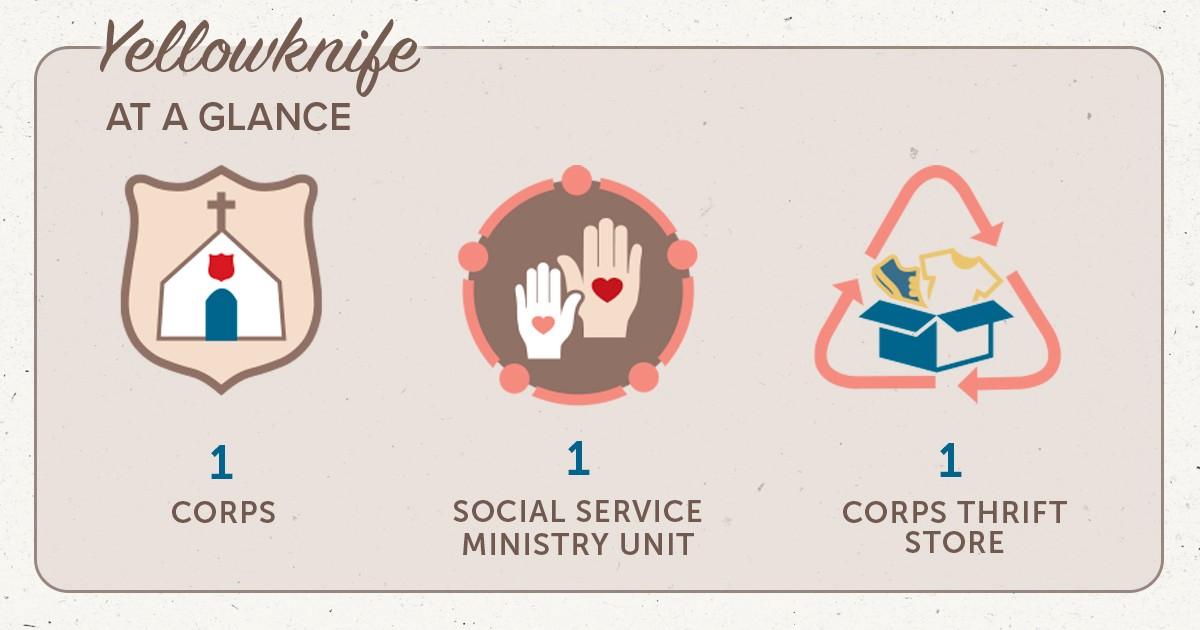
Yellowknife
At A Glance
Lt-Colonel Donald Bladen
Divisional commander
Lt-Colonel Donna Bladen
Divisional officer personnel secretary and divisional spiritual life development secretary
1 Corps
1 Social Service Ministry Unit
1 Corps Thrift Store
This story is from:




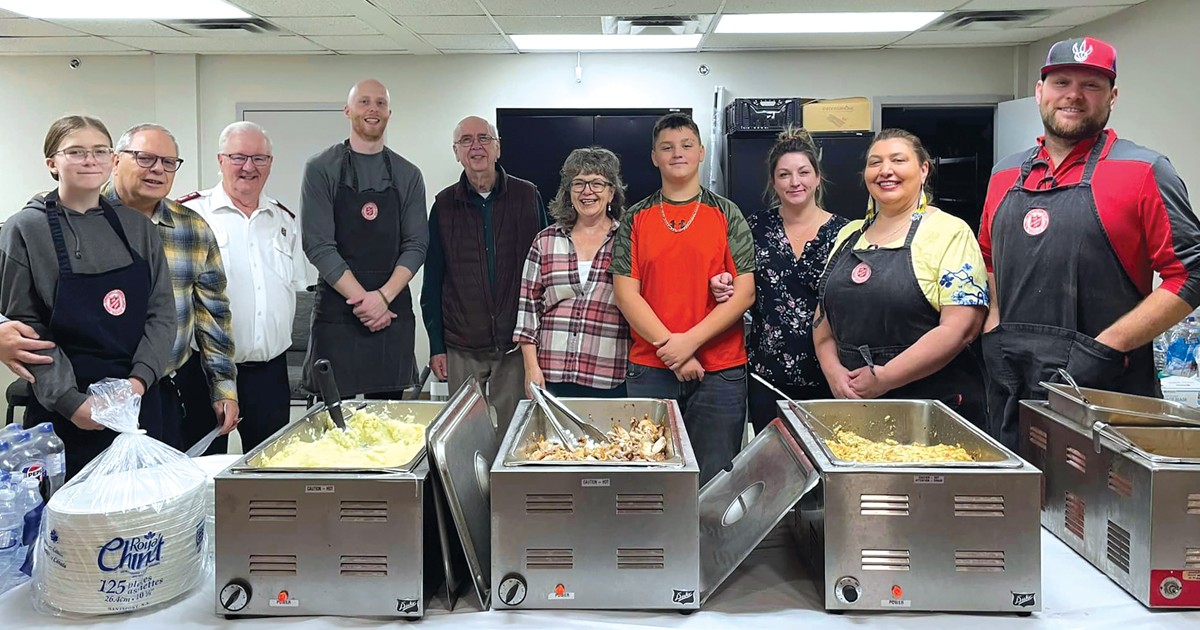





Leave a Comment